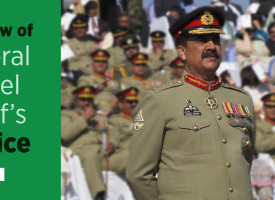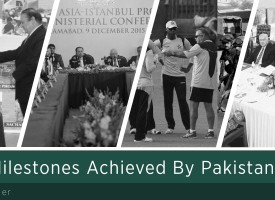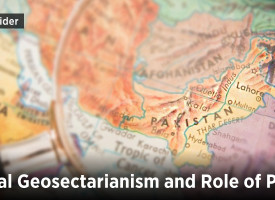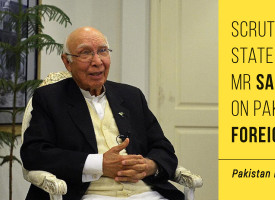Tag "Pakistan"
Prime Minister Muhammad Nawaz Sharif had formally appointed General Raheel Sharif as the 15th Chief Of Army Staff (COAS) on November 27, 2013. The armed forces’ PR wing ISPR recently quoted General Sharif saying that he doesn’t believe in extensions and plans on retiring on due date. This will be a historic precedent for Pakistan, as previous army chiefs either pushed their way to maintain their dictatorships or accepted “extensions”
In what appears to be a significant step forward in Pak-Russia security ties, Commander-in-Chief of Russian Land Forces Col Gen Oleg Salyukov announced on January 22 that his troops will be participating in the first ever army exercises in Pakistan. The yet unnamed exercises with Pakistan, according to Salyukov, are “special mountain drills”, a probable reference to high-altitude warfare training involving special forces from both countries. It is yet unclear
The year 2015 proved to be a game changer for Pakistan in several aspects. Although it would be ignorant to forget major critical problems related to governance, economic growth and the general law and order situation in the country, it is important that important feats be acknowledged. And not just any accomplishments; the 5 selected achievements I have highlighted below are milestones in themselves. I say this not out of
The standoff between two diametrically-opposed ideological regimes in Riyadh and Tehran can be defused if neutral countries like Pakistan and Oman together make concerted efforts to reduce the level of distrust and misconceptions between two important Muslim states which rank among the world’s top ten oil-producing countries. Related: Regional Geosectarianism and Role of Pakistan Historically, Pakistan has tried its best to balance its fragile relationships between Iran and Saudi Arabia.
Pakistan and Sri Lanka are two important South Asian nation states, even more so because of their unique geostrategic locations. Pakistan is the Indian Ocean’s transit route to Afghanistan and Central Asia and eventually Europe, whereas Sri Lanka lies near major sea lanes in the Indian Ocean Region (IOR). Thus, the tiny island state assumed greater importance in the context of maritime trade and combating privacy. Little wonder why China
We live in precarious times. The advent of the Internet was meant to promote the concept of a ‘global village’ but alas, here too the elements of hatred, hostility and strife spared no opportunity to spread discord and discontent rampaging across the Muslim world. With the emergence of two radically opposing sub-factions within Islam (Wahhabi and Shia schools of thought) emerged fault lines which were otherwise hidden from the public
The Worldfolio, a renowned global content service provider, released a report in October acknowledging the increased political and economic stability in Pakistan. The report specially noted that terrorist incidents had declined by 70% in 2015 as compared to 2014. Pakistan Insider presents a timeline of the most prominent events from the previous year which showcases improvements in domestic and foreign-assisted programs to counter terrorism, violence and extremism. The timeline will
On December 21, Mr Sartaj Aziz, the octogenarian Adviser to Pakistani Prime Minister Muhammad Nawaz Sharif on Foreign Affairs, issued a detailed statement before the Senate of Pakistan on ‘Foreign Policy of Pakistan: Achievements and Challenges’. Mr Aziz highlighted the difficult challenges Pakistan has faced as a member of the world community while also mentioning what he said were the current government’s ‘achievements’ on this crucial domain. Before I embark
The race for nuclear technology in South Asia began as early as 1944 when Dr Homi Jehangir Bhabha (known as the father of India’s nuclear program) founded the Tata Institute of Fundamental Research (TIFR) devoted to nuclear studies. Efforts by Bhabha and his associates were gaining attention of statesmen such as Jawaharlal Nehru, founder of an otherwise dialogue-centric Nehruvian school of thought which prioritizes talks over military might. On June
From 16-18 December, the Cyberspace Administration of China in partnership with the provincial government in Zhejiang are jointly hosting the 2nd World Internet Conference in the eastern city of Wuzhen. More than 2000 attendees from over 120 countries are participating in the conference, almost half of them foreign guests. These include government officials, international organizations, Internet companies, academics, experts, think tanks and students from local and international institutes. President Xi









